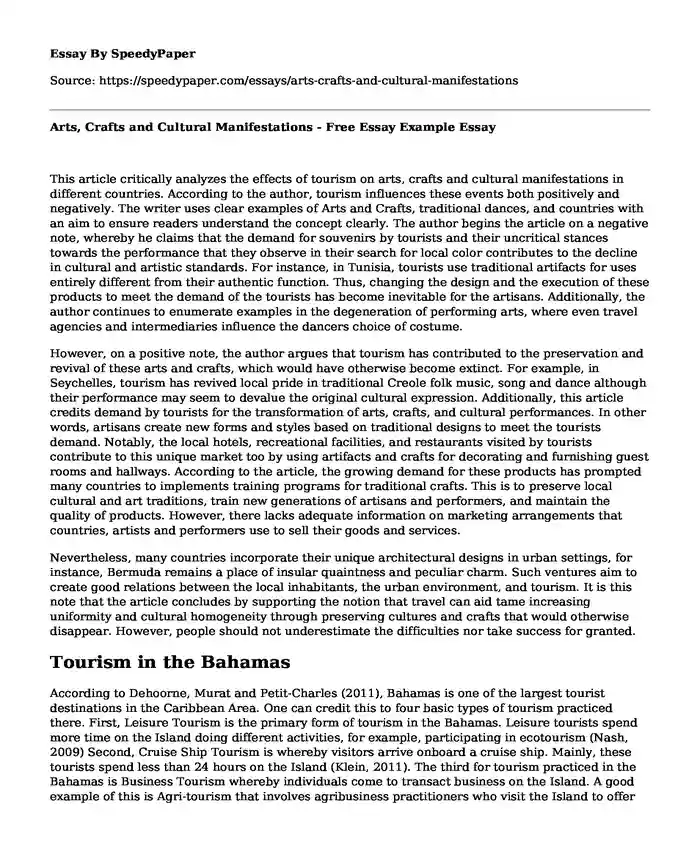This article critically analyzes the effects of tourism on arts, crafts and cultural manifestations in different countries. According to the author, tourism influences these events both positively and negatively. The writer uses clear examples of Arts and Crafts, traditional dances, and countries with an aim to ensure readers understand the concept clearly. The author begins the article on a negative note, whereby he claims that the demand for souvenirs by tourists and their uncritical stances towards the performance that they observe in their search for local color contributes to the decline in cultural and artistic standards. For instance, in Tunisia, tourists use traditional artifacts for uses entirely different from their authentic function. Thus, changing the design and the execution of these products to meet the demand of the tourists has become inevitable for the artisans. Additionally, the author continues to enumerate examples in the degeneration of performing arts, where even travel agencies and intermediaries influence the dancers choice of costume.
However, on a positive note, the author argues that tourism has contributed to the preservation and revival of these arts and crafts, which would have otherwise become extinct. For example, in Seychelles, tourism has revived local pride in traditional Creole folk music, song and dance although their performance may seem to devalue the original cultural expression. Additionally, this article credits demand by tourists for the transformation of arts, crafts, and cultural performances. In other words, artisans create new forms and styles based on traditional designs to meet the tourists demand. Notably, the local hotels, recreational facilities, and restaurants visited by tourists contribute to this unique market too by using artifacts and crafts for decorating and furnishing guest rooms and hallways. According to the article, the growing demand for these products has prompted many countries to implements training programs for traditional crafts. This is to preserve local cultural and art traditions, train new generations of artisans and performers, and maintain the quality of products. However, there lacks adequate information on marketing arrangements that countries, artists and performers use to sell their goods and services.
Nevertheless, many countries incorporate their unique architectural designs in urban settings, for instance, Bermuda remains a place of insular quaintness and peculiar charm. Such ventures aim to create good relations between the local inhabitants, the urban environment, and tourism. It is this note that the article concludes by supporting the notion that travel can aid tame increasing uniformity and cultural homogeneity through preserving cultures and crafts that would otherwise disappear. However, people should not underestimate the difficulties nor take success for granted.
Tourism in the Bahamas
According to Dehoorne, Murat and Petit-Charles (2011), Bahamas is one of the largest tourist destinations in the Caribbean Area. One can credit this to four basic types of tourism practiced there. First, Leisure Tourism is the primary form of tourism in the Bahamas. Leisure tourists spend more time on the Island doing different activities, for example, participating in ecotourism (Nash, 2009) Second, Cruise Ship Tourism is whereby visitors arrive onboard a cruise ship. Mainly, these tourists spend less than 24 hours on the Island (Klein, 2011). The third for tourism practiced in the Bahamas is Business Tourism whereby individuals come to transact business on the Island. A good example of this is Agri-tourism that involves agribusiness practitioners who visit the Island to offer agricultural services, and during their free time, they carry out tourist activities (Hepburn & Badrie, 2010). Finally, in Stopover Tourism, visitors stopping over at the Island have excursions for the short period they are there. Occasionally, many travelers on route to Nassau Island comprise the largest number of stopover tourists in the Bahamas (Ardahaey, 2011).
References
Ardahaey, F. T. (2011). Economic impacts of tourism industry. International Journal of Business and Management, 6(8), 206.
Dehoorne, O., Murat, C., & Petit-Charles, N. (2011). International tourism in the Caribbean area: currentstatusand future prospects. Etudes caribeennes, (16).
Hepburn, E., & Badrie, N. (2010, September). Agri-tourism: A modern development in Bahamian agriculture. In 2009 West Indies Agricultural Economics Conference, July 2009, Barbados (No. 122656). Caribbean Agro-Economic Society.
Klein, R. A. (2011). Responsible cruise tourism: Issues of cruise tourism and sustainability. Journal of Hospitality and Tourism Management, 18(01), 107-116.
Nash, S. (2009). Ecotourism and other invasions. BioScience, 59(2), 106-110.
Cite this page
Arts, Crafts and Cultural Manifestations - Free Essay Example. (2019, Sep 03). Retrieved from https://speedypaper.net/essays/arts-crafts-and-cultural-manifestations
Request Removal
If you are the original author of this essay and no longer wish to have it published on the SpeedyPaper website, please click below to request its removal:
- Animal Behavior Research in Our Free Essay Example
- Free Essay Example on Michael Jackson
- Essay Sample on New Interfaces and New Interactions
- What Is Good Public Speaking? Paper Example
- Free Essay: Woman Suffrage Movement and the Nineteenth Amendment
- Paper Example: Introduction to American Government
- Essay Sample on The Intelligent Designer: Unraveling the Debate Between Science and Religion
Popular categories





